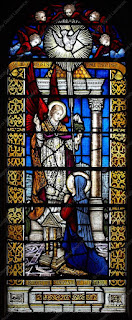'The pattern this day set before us': a Hackney Phalanx sermon for the Annunciation
The fact itself, which has this day been set before us by particular memorial in the sacred office of the Church; the coming of the angel to the blessed Virgin, and the message then announced to her, furnish themes of meditation closely coupled with the great miracle of our redemption by the Incarnation of the Only Begotten Son of God, who took our nature in order to restore it, and to raise it far above its first station in the universe.
How far short shall we fall of the faith of her who was "blessed among women," if we can turn easily to ordinary objects from these first scenes of the Gospel; scenes in which the kingdom of God, and of his Christ was first manifested upon earth, and have been since fulfilled, and will one day be finally accomplished, in the ruin of the common foe to God and man, and in the triumph of faith, humility, and resignation, which have never failed to shine in Christian patterns, and which shall endure for ever ...
The testimony stands as sure, the facts as certain, the happy influences and effects as manifest and lasting, as the monuments of God's accomplished purposes will ever do; as fixed as the counsels and the correspondent issues of his Sovereign Will, to which the blessed Mary declared her full conformity, and on which she built her calm, but dauntless faith, her tried humility, her holy resignation ...
Consider that whole dispensation which has been confirmed in every age by the graces of the Holy Spirit in the hearts of men, of the faithful, humble, unshaken, and devoted servants of an Heavenly Lord and Leader. Look well to the fruits of holiness and zeal, of hope and charity, of constancy and patience, and of well-founded and entire dependence on the Will of God, which meet together in the pattern this day set before us.
It is a significant and revealing example of Old High Marian piety. Holden confidently celebrates Mary's role in the Incarnation. There is no embarrassment about traditional honorific titles for Mary: "the blessed Virgin", "the blessed Mary". It is recognised that our faith falls "far short" of Mary's faith and that she is "the pattern" of "the fruits of holiness". All this is - as with earlier Laudian examples, and in contrast to later 19th century advanced Anglo-catholicism - unambiguously Protestant. There are no suggestions of devotions, titles, or doctrines alien to the Prayer Book. Likewise, any notion of invocation is, of course, entirely absent. Here, in other words, is the Reformed Catholic Marian piety of the Prayer Book, derived from the magisterial Reformation, celebrated by the Laudians, maintained by the Old High tradition, and which remains normative for most contemporary Anglicans.
(The picture is of the Annunciation window in Belfast Cathedral. It is a good example of the Reformed Catholic Marian piety of the Old High tradition: a Scriptural, Reformed recognition of the Blessed Virgin.)




Comments
Post a Comment